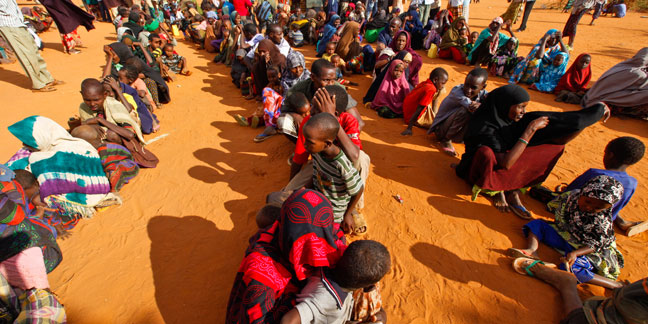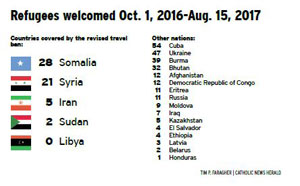 CHARLOTTE — The Diocese of Charlotte continues to resettle refugees who have a “bona fide” relationship with refugees seeking to enter the United States from several majority-Muslim countries under the Trump administration’s temporary travel ban.
CHARLOTTE — The Diocese of Charlotte continues to resettle refugees who have a “bona fide” relationship with refugees seeking to enter the United States from several majority-Muslim countries under the Trump administration’s temporary travel ban.
“We are still receiving cases that have a ‘bona fide’ relationship established,” said Susan Jassan, interim director of its Refugee Resettlement Office for the Diocese of Charlotte. “We expect a total of 25 individuals will arrive between Aug. 3 and Sept. 30.”
As part of his executive order instituting the travel ban, President Donald Trump capped the number of refugees this year at 50,000. That number, which was reached July 12, is down from the 110,000 set by President Barack Obama last October. In 2016, the U.S. took in 85,000 refugees.
The Charlotte diocese has resettled 255 refugees since Oct. 1, 2016. The majority have come from the Ukraine, Burma, Bhutan, Somalia and Syria. Another 54 have come from Cuba, but Catholic Charities’ resettlement and placement services aren’t the same for those individuals.
From the countries banned by the Trump administration, the diocese’s refugee office has welcomed 56 people: 28 refugees from Somalia, 21 refugees from Syria, five from Iran, two from Sudan, and none from Libya or Yemen.
The U.S. Supreme Court said last month that grandparents may be included among those who have a “bona fide” relationship with refugees seeking to enter the United States from the majority-Muslim countries under the Trump administration’s temporary travel ban.
The Supreme Court originally announced June 26 that it would temporarily allow the Trump administration’s plan to ban refugees from the majority-Muslim countries, unless those refugees had “bona fide” relationships with parties in the United States, meaning certain family members, employees or universities.
The government’s list of family members included parents, spouses, children, adult sons or daughters, sons- and daughters-in-law, siblings, fiancés, fiancées and in-law parents. U.S. District Judge Derrick Watson July 13 ordered the Trump administration to expand that list to include grandparents, grandchildren, aunts, uncles, nieces, nephews, cousins and brothers- and sisters-in-law.
With the reduction in the number of refugees expected this year, staffing changes are possible for the local Refugee Resettlement offices in Charlotte and Asheville. More than 20 people work in those offices.
 “We are still waiting to make decisions on staffing changes,” Jassan said. “It will certainly be difficult to maintain our current staffing level with decreased arrivals.”
“We are still waiting to make decisions on staffing changes,” Jassan said. “It will certainly be difficult to maintain our current staffing level with decreased arrivals.”
So far, the RRO has not made any staffing changes as a result of the travel ban, she said.
The travel ban and the current political climate in the United States have caused some concerns for refugees who are already here, Jassan noted.
“We heard refugees expressing fears about living in the U.S. after the first executive order was issued in January,” she said. “It is not currently an overt expression on the part of refugees, as it was then.”
The Supreme Court has scheduled Oct. 10 to hear oral arguments in the Trump travel ban case.
— Kimberly Bender, online reporter. Catholic News Service contributed.
Pictured: Somali refugees are seen after arriving in 2011 at a camp in Dadaab, Kenya.In Dadaab, the world's largest refugee complex in northeast Kenya, Somali refugees are facing the question of whether to return to their homeland or stay and risk being forced to move if the Kenyan government closes the camp. (CNS photo/Dai Kurokawa, EPA)


